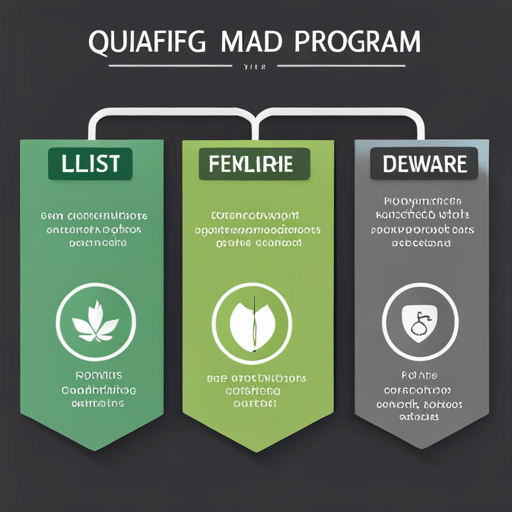Delaware’s medical marijuana program, established in 2011, has made significant strides in providing access to cannabis for patients suffering from a limited list of qualifying conditions. However, there is increasing evidence to suggest that expanding the list of qualifying conditions may lead to improved health outcomes and enhanced well-being for a broader range of individuals. The process of adding new qualifying conditions can be complex and requires careful consideration of scientific research, patient needs, and medical expertise. In order to optimize the potential benefits of medical marijuana, it is crucial to examine the merits of including additional ailments within the framework of Delaware’s existing program.
Table of Contents
As policymakers contemplate the expansion of qualifying conditions for medical marijuana use in Delaware, they must weigh the potential benefits against any potential risks or challenges. This includes evaluating empirical evidence surrounding various health conditions and their responsiveness to cannabis treatment as well as addressing regulatory concerns that may arise with expanded access. By engaging in an objective analysis guided by scientific research and clinical experience, stakeholders can ensure that any changes made align with both public health objectives and individual liberties. Embracing this process will not only contribute positively to patient care but also empower individuals seeking alternative therapeutic options by granting them increased autonomy over their own healthcare decisions.
Key Takeaways
– Policymakers in Delaware are considering expanding the list of qualifying conditions for the state’s medical marijuana program.
– Broadening access to medical marijuana may offer relief for chronic pain, anxiety, PTSD, depression, and reduce opioid use.
– Adding conditions such as autism spectrum disorder, anxiety disorders, and opiate addiction may be considered.
– Policymakers must address regulatory concerns and ensure an evidence-based approach to updating the list of qualifying conditions.
Current State of Delaware’s Medical Marijuana Program

In Delaware, the medical marijuana program currently serves over 10,000 patients, highlighting its significant role in providing alternative healthcare options to residents. Established under the Delaware Medical Marijuana Act (DMMA) of 2011, this program allows for the use of cannabis for medicinal purposes under certain qualifying conditions such as cancer, HIV/AIDS, and multiple sclerosis. Despite these advancements in policy, social stigma remains a barrier to access for many potential patients who could benefit from medical marijuana usage.
The economic impact of the medical marijuana program in Delaware is substantial and continues to grow with more dispensaries opening across the state. According to recent data from the National Organization for Reform of Marijuana Laws (NORML), sales generated by these dispensaries reached $17 million in 2020 alone. This figure not only reflects increasing patient demand but also demonstrates how medical marijuana can contribute positively to state revenue through taxation and regulation.
As policymakers consider expanding qualifying conditions within Delaware’s medical marijuana program, it is crucial to examine evidence-based research on potential benefits while also considering any negative consequences that may arise due to increased accessibility. By fostering an informed dialogue about proposed changes and addressing existing barriers such as social stigma associated with cannabis use or bureaucratic obstacles that hinder patient access, it becomes possible to create a comprehensive approach towards improving healthcare options within the state.
Benefits of Adding New Qualifying Conditions

Expanding the list of qualifying conditions for medical marijuana programs, such as Delaware’s, presents several potential benefits for patients and researchers. Increased patient access to alternative treatments may contribute to a reduction in opioid usage by providing an additional option for pain management. Furthermore, adding new qualifying conditions could stimulate expanded research opportunities, leading to a better understanding of the therapeutic potential of medical cannabis and informing future policy decisions.
Increased Patient Access
Enhancing patient access to Delaware’s medical marijuana program could potentially provide relief and improved quality of life for individuals suffering from a wider range of qualifying conditions. By adding new qualifying conditions, more patients would be eligible for medical marijuana treatment, which may offer benefits not found in traditional pharmaceutical treatments. Additionally, expanding the list of qualifying conditions may lead to increased patient education on the potential benefits of medical marijuana and promote the establishment of more accessible dispensaries throughout the state.
Some possible benefits that can be derived from increasing patient access include:
– Reduced reliance on opioids and other addictive medications
– Alleviation of symptoms related to chronic pain, anxiety, or other debilitating conditions
– Improved mental health support for those suffering from PTSD or depression
– Increased availability and accessibility of alternative treatment options
– Greater awareness and understanding about the safety and efficacy of medical marijuana as a viable option for symptom management
By broadening the scope of Delaware’s medical marijuana program to encompass additional qualifying conditions, policymakers can foster an environment where patients have greater freedom to explore alternative treatment options that best suit their individual needs. This expansion also has the potential to propel further research into understanding how cannabis-derived therapies can benefit various populations while presenting opportunities for growth in both healthcare services and businesses centered around providing these products. Ultimately, this development would contribute positively towards building a healthier society with increased freedom in making decisions about personal well-being.
Potential Reduction in Opioid Use
Broadening patient access to cannabis-based treatments could potentially lead to a significant decrease in opioid use, as individuals suffering from chronic pain and other debilitating conditions may find effective relief through alternative therapies. Numerous studies have demonstrated the potential of medical marijuana as an alternative treatment for various medical conditions, including chronic pain management, which is one of the leading causes for opioid prescriptions. By expanding qualifying conditions under Delaware’s Medical Marijuana Program, more patients may have access to a safer and effective option for pain relief and symptom management.
Patient education is paramount when discussing the benefits of medical marijuana as an opioid alternative. Ensuring that both patients and healthcare providers are well-informed about the potential risks and advantages of using cannabis products can encourage informed decision-making regarding treatment options. As Delaware moves toward broadening its Medical Marijuana Program, it is essential that policymakers prioritize educational initiatives that promote understanding amongst all stakeholders involved in patient care. By doing so, not only can this policy change contribute to reducing opioid dependency rates but also help foster a more open-minded approach towards exploring innovative therapeutic options.
Expanded Research Opportunities
Increased access to cannabis-based treatments presents a valuable opportunity for advancing research in the field of alternative therapies and uncovering new potential applications for medical marijuana. As Delaware considers adding qualifying conditions to its medical marijuana program, it is essential to recognize the benefits that can arise from expanding research opportunities. By broadening the scope of the program and allowing more diverse patient populations to access medical cannabis, researchers will be better equipped to study its efficacy in treating various conditions and potentially contribute to advancements in public health policy.
1. Research advancements: With an expanded pool of patients using medical marijuana for a wider array of conditions, researchers can collect valuable data on effectiveness, dosing guidelines, side effects, and long-term outcomes.
2. Program evolution: As evidence-based knowledge grows regarding the uses and benefits of medical marijuana, Delaware’s program may evolve further by incorporating new treatment options backed by scientific data.
3. Economic growth: Investing in extensive research has the potential not only to improve patient care but also foster economic growth through job creation within the scientific community and development of innovative treatment methods.
4. Global impact: By supporting robust research efforts within Delaware’s medical marijuana program, other states and countries could benefit from these findings as they develop or modify their own policies surrounding cannabis use for medicinal purposes.
Ultimately, expanding qualifying conditions within Delaware’s medical marijuana program offers a unique opportunity to advance our understanding of cannabis-based therapies while contributing positively towards public health initiatives on a global scale. This expansion allows for increased collaboration between healthcare providers, researchers, policymakers, and patients – all working together towards a common goal – enhancing quality of life through alternative therapeutic approaches guided by evidence-based science.
The Process for Updating the List of Qualifying Conditions

A thorough evaluation and systematic revision of the list of qualifying conditions is crucial for ensuring that Delaware’s medical marijuana program remains relevant, accessible, and beneficial to patients in need. The process for updating the list should be evidence-based and driven by policy changes that align with current research findings. As new studies emerge supporting the use of medical marijuana for various health conditions, Delaware amendments must be made to adapt the program accordingly. This will ensure that program accessibility is maintained for all eligible citizens who can benefit from this alternative treatment option.
In order to update the list of qualifying conditions effectively, it is essential to have a transparent and inclusive decision-making process involving various stakeholders such as healthcare professionals, researchers, policymakers, and patient advocacy groups. Collaboration between these parties allows for a comprehensive understanding of scientific evidence regarding medical marijuana’s therapeutic potential for different health conditions. Furthermore, engaging with stakeholders enables identification of barriers or limitations within the existing regulatory framework which may hinder program expansion in response to emerging research findings.
By continuously assessing and refining the list of qualifying conditions through an evidence-based approach and active stakeholder involvement, Delaware’s medical marijuana program can remain adaptive to changing patient needs and advances in scientific knowledge. This process not only ensures that patients have access to appropriate treatment options but also demonstrates a commitment to providing safe, effective alternatives within an evolving healthcare landscape. Ultimately, keeping abreast with ongoing research developments and adapting policies accordingly are key factors in maintaining a responsive medical marijuana program aimed at improving quality of life for patients across Delaware.
Potential Conditions to Be Added

Expanding the scope of eligible health conditions based on emerging research findings can enhance the effectiveness and accessibility of therapeutic cannabis use for patients in need. As scientific studies continue to unveil innovative treatments and alternative therapies involving medical marijuana, it is crucial for policymakers to consider adding potential qualifying conditions to Delaware’s medical marijuana program. By doing so, they will not only improve the lives of those suffering from debilitating illnesses but also foster an environment that supports evidence-based decision-making in healthcare.
Some potential conditions that could be added to Delaware’s list of qualifying conditions include autism spectrum disorder, anxiety disorders, and opiate addiction. Research has shown promising results for individuals with these conditions who have utilized medical cannabis as a treatment option. For example, studies have demonstrated that cannabinoids may help reduce symptoms associated with autism such as irritability, hyperactivity, and social withdrawal. Similarly, individuals suffering from anxiety disorders have reported improvements in their symptoms after using medical cannabis under appropriate guidance. Furthermore, there is growing evidence suggesting that medical marijuana could play a significant role in combating the opioid epidemic by providing an effective alternative treatment for pain management.
By acknowledging the emerging scientific evidence supporting the therapeutic benefits of cannabis for these additional health conditions, policymakers can make informed decisions when expanding Delaware’s medical marijuana program. This expansion would ultimately provide relief to countless individuals who are currently unable to access this potentially life-changing form of treatment due to restrictive eligibility criteria. It is essential for policymakers to remain open-minded and adaptive when considering new information about innovative treatments and alternative therapies involving medical cannabis so that they can make well-informed decisions regarding public policy on therapeutic drug use in their jurisdiction.
Challenges and Next Steps

Addressing legal and regulatory concerns is a crucial aspect of expanding Delaware’s medical marijuana program to include additional qualifying conditions. Ensuring safe and responsible expansion requires thorough evaluation of potential risks, benefits, and implementation strategies for patients and communities. Ongoing advocacy for patient access to medical marijuana is essential in promoting informed policy decisions that serve the best interests of individuals who may benefit from this treatment option.
Addressing Legal and Regulatory Concerns
Navigating the complex legal and regulatory landscape is crucial for ensuring the successful inclusion of additional qualifying conditions in Delaware’s medical marijuana program, a process that can greatly impact patients’ access to alternative treatment options. In order to address potential legal loopholes and facilitate necessary regulatory adjustments, stakeholders must engage in a comprehensive analysis of existing policies and frameworks governing the use of medical marijuana. This will not only identify areas requiring reform but also minimize potential risks associated with expanding access to this alternative treatment.
1. Conducting thorough research on current state laws and federal regulations regarding medical marijuana use is essential in identifying any inconsistencies or gaps that may hinder efforts to expand qualifying conditions.
2. Engaging with key stakeholders such as healthcare providers, patient advocacy groups, and policymakers can foster open dialogue about potential challenges and strategies for addressing them while ensuring that proposed changes are evidence-based and policy-driven.
3. Examining successful examples from other states that have expanded their medical marijuana programs can offer valuable insights into best practices for implementing similar changes within Delaware’s context.
4. Developing clear guidelines on the approval process for adding new qualifying conditions can help streamline decision-making processes, thereby expediting patients’ access to alternative treatments.
By addressing these legal and regulatory concerns in a systematic manner, Delaware can work towards creating a comprehensive framework that supports the safe expansion of its medical marijuana program while prioritizing patients’ needs. Ultimately, this will contribute to fostering an environment where individuals have greater freedom to explore viable alternatives for managing their health conditions under appropriate guidance from healthcare professionals.
Ensuring Safe and Responsible Expansion
Undertaking a careful and responsible approach to broadening access to alternative treatments is pivotal in ensuring patient safety and upholding the integrity of existing healthcare frameworks. Responsible expansion of Delaware’s medical marijuana program entails considering various factors such as thorough vetting of qualifying conditions, establishing clear guidelines for physicians, and continuously evaluating the impact on public health. By addressing these aspects, policymakers can foster an environment that supports safe implementation while also providing patients with much-needed relief.
An essential component of responsible expansion is developing evidence-based criteria for adding new qualifying conditions, which will allow medical professionals to make informed decisions about recommending medical marijuana. Additionally, ongoing research should be encouraged to better understand its long-term effects on patients and identify any potential risks associated with its use. Furthermore, it is imperative to establish robust regulatory oversight mechanisms that ensure dispensaries operate within legal bounds, maintain high-quality standards for products, and prioritize patient safety. Engaging in these measures can promote a well-regulated industry that respects individual freedoms while maintaining the highest possible level of care for those who rely on medical marijuana as a treatment option.
Ongoing Advocacy for Patient Access
Having established the importance of ensuring safe and responsible expansion for Delaware’s medical marijuana program, attention must now be given to the ongoing advocacy for patient access. Advocacy efforts should focus on increasing accessibility, affordability, and availability of medical cannabis while prioritizing patient education and caregiver support. By doing so, the state can ensure that patients who qualify for the program are able to fully benefit from this alternative treatment option.
Patient education and caregiver support are crucial components of a successful medical marijuana program. In order to provide comprehensive information on qualifying conditions, application processes, dosages, administration methods, and potential side effects or interactions with other medications, dedicated resources should be allocated towards these aspects. The table below outlines some key areas where ongoing advocacy efforts can make a significant impact in improving patient access:
| Area of Focus | Description |
|---|---|
| ————————— | ———————————————————————————————– |
| Patient Education | Develop educational materials (print & digital) tailored for patients about medical cannabis use |
| Caregiver Support | Provide training programs and resources to assist caregivers with administering medical cannabis |
| Accessible Dispensaries | Ensure adequate distribution points across the state for ease of access |
| Affordability | Advocate for insurance coverage or financial assistance options for qualified patients |
| Expanding Qualifying Conditions | Work towards adding more conditions eligible under Delaware’s medical marijuana program |
By addressing these areas through policy recommendations and collaborations among stakeholders such as healthcare professionals, legislators, and patient advocacy groups – it is possible to create an environment where Delaware’s residents have improved access to medicinal cannabis as part of their treatment plans. This will not only enhance individual health outcomes but also contribute significantly toward a greater sense of freedom within society by providing alternatives to traditional pharmaceutical treatments.
Frequently Asked Questions
How does Delaware’s Medical Marijuana Program compare to similar programs in other states?
Comparative analysis reveals that Delaware’s medical marijuana program demonstrates moderate effectiveness, with state comparisons showing variation in qualifying conditions, regulatory frameworks, and patient access across the United States.
Are there any potential negative consequences of adding new qualifying conditions to the program?
A 2019 study revealed a 7.6% increase in recreational cannabis use among US states with medical marijuana programs. Potential drawbacks of adding new qualifying conditions include unforeseen consequences, such as increased non-medical usage rates.
How can patients and healthcare providers advocate for the inclusion of additional qualifying conditions in the future?
Enhancing medical marijuana accessibility necessitates active collaboration between healthcare providers and patients, emphasizing evidence-based policy-making and patient feedback integration for the inclusion of additional qualifying conditions.
What kind of research or evidence is needed to support the addition of a new condition to the list of qualifying conditions?
In the labyrinth of policy change, qualifying criteria demand evidence-based evaluations. Robust research studies and clinical trials provide crucial support for inclusion of new conditions, advancing towards a horizon of therapeutic liberty.
Are there any plans to expand the availability of medical marijuana to patients in Delaware, such as through increased dispensaries or home cultivation options?
Dispensary accessibility and cultivation regulations in Delaware are currently under evaluation, with potential plans to expand medical marijuana availability through increased dispensaries and home cultivation options for patients’ enhanced therapeutic freedom.

